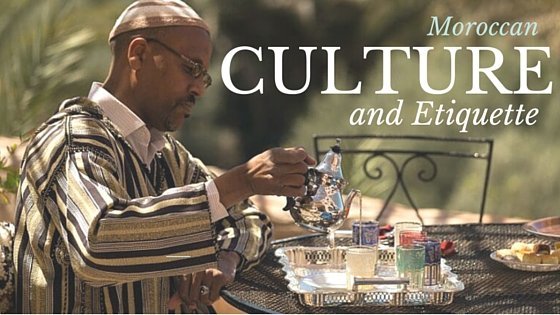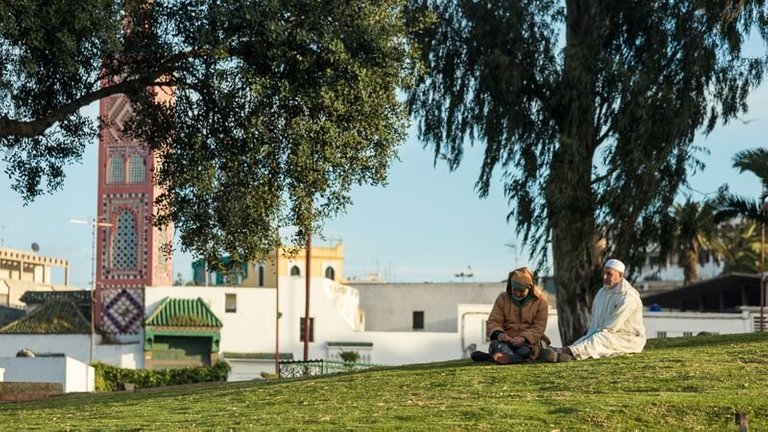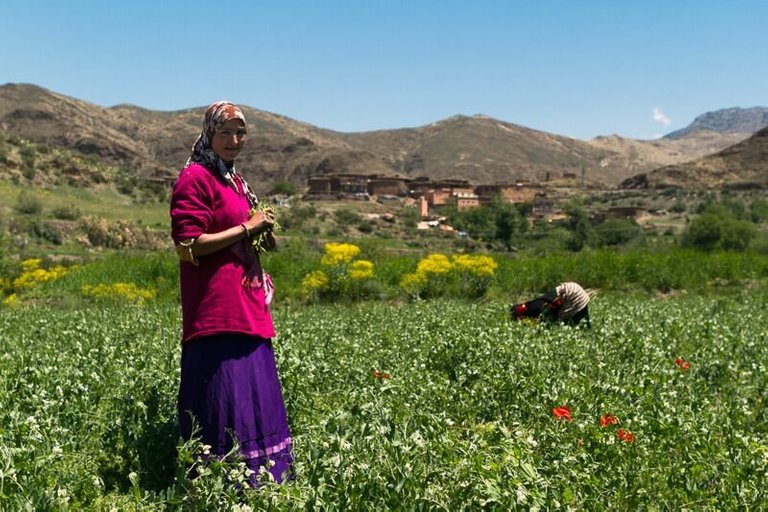
Morocco has been called “home” by many different people throughout the centuries. In addition to the indigenous Amazigh (Berbers), the country has hosted a variety of cultures coming from the East (Phoenicians and Arabs), the South (Sub-Saharan Africans), and the North (Romans and Spanish Andalusians – both Muslim and Jewish) throughout history.Today, the majority of the population identifies as Berber or Arab and the country’s official language is Arabic. Morocco is a Muslim country, with 99% of its population identifying as Sunni Muslim, but religious minorities are widely respected.Moroccans are a very welcoming and tolerant people towards different cultures, ideas and ways of life. This doesn’t mean they don’t have strong beliefs and cultural norms – and you should definitely avoid offending those at all costs. Things that may be commonplace in your native culture can be misinterpreted when discussing culture and etiquette in Morocco. Below are a few rules (or hints) to make sure you respect the culture throughout your tour of Morocco and as you make heads and tails of this fascinating country.
Clothing
As a conservative and religious country, clothing is something you have to be mindful of when visiting Morocco. Especially in rural areas, you should always attempt to cover body parts considered “private”. For women, this can mean covering the arms (or at least the shoulders) and the knees up. For men, it requires covering up the shoulders and above the knee.In cosmopolitan cities, such as Marrakesh, Rabat and Fez, the dress code is more relaxed and common to see women wear short-sleeve tops and knee-length skirts and men often wear sleeveless t-shirts. If you are ever unsure about what to wear, keep in mind that the best guide to knowing what is appropriate is to note how the locals dress and follow their lead.
Greetings and Gestures
Moroccans tend to be more formal when greeting than Westerners. When you meet someone for the first time, it is common to inquire about marital status, children, as well as the health and well-being of one’s family. Moroccans typically greet with a handshake and sometimes two kisses (starting with the left cheek) but this only occurs when the two people greeting are of the same sex. In any greeting that takes place between a man and a woman, the woman should extend her hand first if she wants to be greeted – if she does not do this, a man should bow his head in greeting.Public displays of affection in Morocco should also be kept to a minimum, as this is a conservative culture. Hand holding is considered platonic between members of the same sex but homosexuality between Moroccans is illegal. (Read more about Morocco for LGBTQ travelers in this post.)Any gesture you make in Morocco should be done with your right hand (yes, even if you’re traditionally a lefty!). The left hand is considered impure and is saved for bathroom duties and cleaning chores. All greetings, dining manners and other gestures should be done with your right hand. It is also impolite in Morocco to point at someone with your index finger to motion them towards you. You should instead beckon someone by placing your palm downward and sweeping your hand towards yourself.
Mosques

Unfortunately, if you are not Muslim, you are not allowed to enter most mosques in Morocco. The only exceptions to this rule are the ancient Tin Mal Mosque in the High Atlas, the Great Mosque at Smara in the Western Sahara, the courtyard of the imperial sanctuary-mosque of Moulay Ismail in Meknes, and the Hassan II Mosque in Casablanca.
In other mosques, your experience is limited to a few snapshots of the magnificent outer structure and some stolen glimpses through open doors. However, even in these cases you should be sensitive: peering into mosques may be considered acceptable to locals in the main tourist cities, but in the country you should be a bit more hands off.
Walking through graveyards, near koubbas (tombs of local saints), and near zaouias (religious schools and monasteries) should also be avoided as these are considered holy places.
Ramadan
Ramadan is a month-long holy celebration held each year in the Islam world. The Islamic calendar follows a lunar pattern so every year Ramadan is held at a different time in the Western calendar (it generally moves 10 days forward on the later calendar from year to year). This month of celebrations is dedicated to swam, or fasting, which is one of the five pillars of Islam. From sunrise to sunset, the faithful abstain from food, drink, tobacco, and sexual thoughts and activity to focus on spiritual renewal.
As you can imagine, this month of fasting has a deep impact on daily life in Islamic countries and Morocco is no exception. While traveling during Ramadan is a great opportunity to discover Islamic culture and customs, it does require some planning ahead. Although you are not required to fast while in Morocco during Ramadan, it is expected that you show respect by avoiding eating and drinking in public places. For more practical information on how to travel in Morocco during Ramadan we have a complete post on the subject.
Dining and Social Events

If you happen to be invited into someone’s home, know you will have an amazing experience. However there are also some rules of etiquette to be followed. First, it’s important to always make sure that your spouse was also invited with you. Some Moroccan families may be more conservative and thus not entertain mixed-sex groups or may organize separate dining areas for women and men.As soon as you enter the home, you should remove your shoes and leave them by the door (your host will let you know if such a formality is not needed). It is also a good custom to come bearing gifts. These can typically be a treat such as pastries, figs, dates, nuts or fresh juices. Fresh flowers can also make a great gift and you can also consider bringing a smaller present for the children of the household. Avoid bringing alcohol (unless you know that your host drinks and exactly what they enjoy) and never bring hot dishes.Once dinner is ready, expect to be seated on a floor mat around a knee-high round table with one communal dish in the middle, or on couches around a large round table. Before the meal is served, a wash basin may be brought to the table: hold your hands over it while the water is poured and then dry them on the towel provided. When your host starts eating you may begin as well. If you are eating from a communal dish, keep to the triangle of food immediately in front of you. It is custom to use your right hand to eat however if you are left handed it typically is not an issue or faux pas. Expect more food to be offered to you once you stop eating. It is polite to refuse the first time and then take a small portion upon a second food offering. If you are completely full, simply pat your stomach and shake your head while saying “La, shukrran” (“No, thank you”). Do not be surprised if your host continues to push you to eat, it is a sign of respect and generosity.
Tipping

Tipping in Morocco is customary, so you will be expected to leave a few dirham in a number of places during your travels through the country. Although there is no standard amount that you should always leave in different establishments and different circumstances, we’ve covered the most basic rules of thumb to help you out.In hotels, you should tip bellboys (10-20dh depending on the size and number of suitcases) and cleaning maids (20dh or 100dh per week). At restaurants, you should always tip your waiters but this will vary according to the style of the restaurant: consider leaving about 5dh in moderate places and 10%-15% in more upmarket establishments. At museums, monuments and local tourist attractions, it is custom to leave 3-5dh to curators.If you indulge in a spa treatment during your holiday, you should consider tipping here as well: it’s customary to leave 20dh to 25dh per person that services you.Taxi drivers don’t typically expect a tip but generally appreciate it so you can always consider rounding up your bill to the nearest 5dh.Tipping tour guides and drivers is a more subjective experience. You can consider giving 100dh per hour to your professional tour guide and giving anywhere from 5% to 10% to your driver at the end of your trip. If you get lost and someone helps you find your way back to your hotel, restaurant, etc., consider offering a 5dh or 10dh tip.In all cases, tipping is a very emotive attitude and it’s often based on a personal perception of the quality of the service provided. Even though it is customary to tip in Morocco, how generous you are can be left up to you and to your satisfaction. The most important thing to remember, however, is to never ask someone how much they are expecting to receive in tips from you. This will only lead to an awkward conversation and you will still be left in the dark.
Women in Morocco

There is no doubt that for women traveling in Morocco it is different than traveling in a Western country. In Morocco, gender roles are much more defined and the traditional views of a patriarchal society are quite prominent which means women will have to take extra precautions when discovering the colorful streets of Morocco. Women may experience catcalling and more attention from members of the opposite sex, the best way to deal with this is to completely ignore them. Should you feel uncomfortable at any time, promptly alert the nearest police officer for assistance.
Women are generally expected to dress more modestly, not engage in drinking or smoking in public, and avoid physical contact with men. Although this code of behavior is now more relaxed in big cities such as Rabat, Marrakesh and Fez, it is important to follow it in rural Morocco. Pay attention to the Moroccan women around you to gain helpful clues as to what is acceptable. Visiting women are not expected to dress as Moroccans do, but a little bit of respect can go a long way.
We hope these basic culture and etiquette tips will help you have an enjoyable time in Morocco without worry!
https://www.journeybeyondtravel.com/morocco/culture-etiquette/
Hi! I am a robot. I just upvoted you! I found similar content that readers might be interested in:
https://www.journeybeyondtravel.com/morocco/culture-etiquette/
upvoted this post as well.